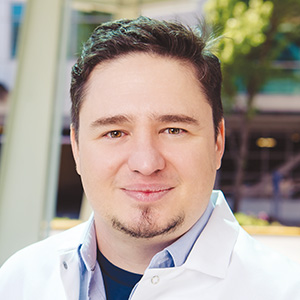
Studies by scientists from a Providence St. Joseph Health research center are confirming that testing called comprehensive genomic profiling of tumors can lead to improved treatment, better outcomes and longer life for patients with advanced cancer.

Dr. Carlo Bifulco, chief medical officer of Providence Genomics and Brian Piening, program director of Providence Genomics, say while the testing is proving its worth, there are barriers to access. They believe the profiling should be more widely available, better reimbursed by insurers and used more often by providers. Bifulco and Piening practice at Providence's Earle A. Chiles Research Institute in Portland, Oregon.

Bifulco says it is unique to have extensive and advanced research such as genomics studies conducted at a nonprofit health system. Piening says Providence leadership has prioritized investment into such research "because we thought we could make an impact."
Bifulco adds that the cancer research "is crucial to improving patient outcomes."
'Groundbreaking discoveries'
According to the most recent statistics from the Centers for Disease Control and Prevention, there were 1.7 million new cancer cases reported nationwide in 2021 and 608,366 people died of cancer in 2022. The CDC says there are racial disparities when it comes to the prevalence of cancer. For instance, the agency says on its website, "compared to members of other racial and ethnic groups, Black and African American people have higher rates of getting and dying from many kinds of cancer."
The Research Institute has been studying cancer since 1993, with immunotherapy its main area of concentration. Immunotherapy involves treatments that boost the body's immune system against cancer. Bifulco and Piening are among the 200-plus investigators and research personnel practicing at the Research Institute, an arm of the Providence Cancer Institute. The Research Institute garners more than $10 million annually in federal, private and sponsored research funding.
The institute says on its website that advancements in genomic sequencing are enabling clinicians to use immunotherapy and personalized precision medicine "to accelerate leading-edge research and groundbreaking discoveries for patients with cancer."
Advancements in testing
Comprehensive genomic profiling is used to extract and analyze genomic information from cancerous tissue to more precisely target treatment.
A press release from the Research Institute explains that the profiling "assesses hundreds of cancer biomarkers across various tumor types in a single test." This extensive assessment activity "can guide patients toward targeted treatments or immunotherapies that may not have been identified through more limited genomic testing approaches." Artificial intelligence applications help scientists process the extensive information gained through the testing.
Piening explains that the more genomic testing method uses "small panel" testing that looks at selected genes in isolation. This can be a very piecemeal approach, notes Bifulco, because scientists may need to repeat different assessments to home in on the correct biomarkers to target. Precious time can be lost as different assessments are completed one after another.
Around 2019, the Research Institute was one of the first labs to go live with comprehensive profiling, says Bifulco. Piening notes that it was quite an investment from Providence to equip a lab to do this profiling, since it requires a large software team, a large lab team and a lot of computing power. Any Providence facility can use the lab's services; the lab only serves Providence facilities. Providence has 51 hospitals, more than 1,100 physician clinics and a network of other facilities across seven western states.
Evidence of benefits
Research Institute team members, including Bifulco and Piening, have been involved in two recent studies that have borne out or are bearing out the benefits of comprehensive genomic profiling. The newest study, "Widespread Adoption of Precision Anticancer Therapies After Implementation of Pathologist-Directed Comprehensive Genomic Profiling Across a Large US Health System," is detailed in the Nov. 12 issue of the Journal of Clinical Oncology — Oncology Practice.
The study focused on the first two years of a five-year study involving 3,216 Providence patients with several types of cancer at an advanced stage. The researchers provided the results of comprehensive genomic profiling to patients' clinicians 12 days before the patients' initial oncology visit. The ongoing study is finding that receiving such results influenced the early clinical decision-making process and led to over half of the patients receiving biomarker-driven targeted therapy or immunotherapy. Patients who got this precision therapy had a longer survival period than those who had chemotherapy alone.

Results of the prior study, "Clinical impact for advanced non-small-cell lung cancer patients tested using comprehensive genomic profiling at a large USA health care system," were published in the September 2024 issue of ESMO Real-World Data and Digital Oncology. The study had similar findings to the latter one but was focused on a particular type of cancer, non-small-cell lung cancer.
Access disparities
Bifulco and Piening say this and other research around targeted precision therapies represents a significant step toward more personalized and effective cancer treatment.
But, they say, there are many barriers to widespread adoption of these promising testing and treatment protocols. First, not all payers reimburse for this type of testing in part because it is not yet widely practiced and so does not yet have an extensive track record. Second, not all clinicians are aware of the testing and its benefits. Part of the Research Institute's work is to educate and train oncology clinicians throughout Providence on the availability and promise of this testing.
Beyond these challenges that are particular to comprehensive genomic profiling are broader disparities, notes Bifulco. For instance, only a small percentage of people who are eligible for participation in potentially lifesaving research actually take part. People of color have an even lower participation rate than white people, he notes.
Bifulco says the Research Institute is working to understand and address these and other disparities around cancer care.
"Cancer is considered to be a disease driven by our genes, but unfortunately, genomic testing is considered optional," he says. "We want to ensure it becomes part of the care for everyone."
'New era of cancer care'
Bifulco and Piening are very optimistic about the advancements that are possible with genomic profiling and other highly personalized treatments.
"Eventually I believe the genome will become part of a patient's electronic medical record and (genetic profiling) will affect all care decisions" when it comes to cancer, says Piening.
He notes that comprehensive genomic profiling could provide important clues on genetic impacts for family members of people with advanced cancer.
He says advancements in this field are having a "pretty profound impact" on cancer treatment and there are countless possibilities for expanding this research and its applications.
"We're clearly in a new era of cancer care based on precision medicine," says Piening, "and that is very important."
